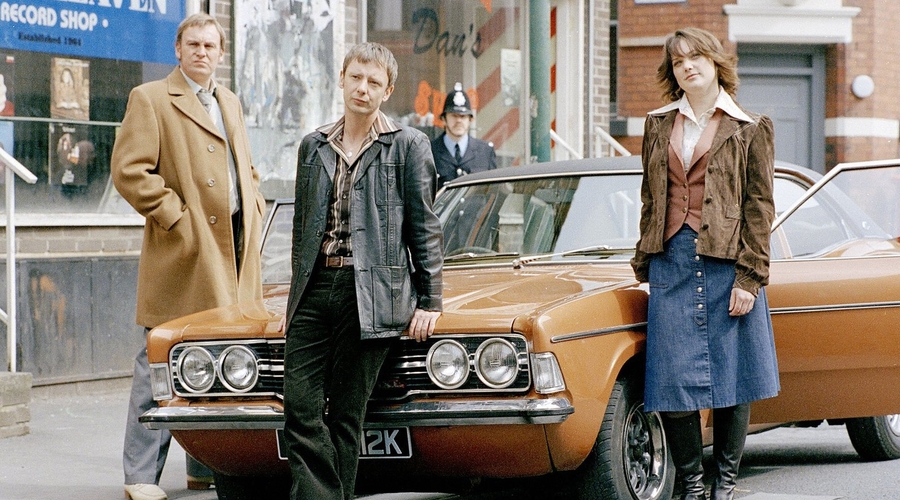Matthew Bell hums along to a gloriously funny reconstruction of the bad attitudes and fashions of 1970s crime-fighting
Galloping inflation, strikes, oversized flares, platform boots, and suffocating heat. It’s almost as if we’re reliving the 1970s. And the perfect TV companion? Look no further than the hugely enjoyable and critically adored sci-fi cop series Life on Mars.
Sam Tyler (John Simm), a by-the-book, impeccably liberal detective in noughties Manchester, is knocked unconscious by a speeding car while listening to David Bowie’s Life on Mars?… and wakes up, dressed in big collar, Chelsea boots and leather jacket, in 1973.
He’s still a cop, though a fish out of water in the unreconstructed police force of the 1970s. In shock, Tyler is told by young detective Chris Skelton (Marshall Lancaster) that “you’re as white as a ginger bird’s arse”. Immediately, the viewer knows where they are – The Sweeney with added irony.
Skelton, though, is only the hors d’oeuvre for the show’s main course, Philip Glenister’s snarling DCI Gene Hunt, a man accurately described by Tyler as “an overweight, over-the-hill, nicotine stained, borderline-alcoholic homophobe with a superiority complex and an unhealthy obsession with male bonding”. To which, Hunt’s rejoinder is: “You make that sound like a bad thing.”
The police creed, according to Hunt, reads: “Grab ’em by the balls and their hearts and minds will surely follow.”
The writers, principally Matthew Graham and Ashley Pharoah, who co-created Life on Mars with TV legend Tony Jordan, have a huge amount of fun with the dialogue. Here’s Hunt, oblivious to the coming of Margaret Thatcher, wading into politics: “There will never be a woman prime minister as long as I have a hole in my arse.”
Production designers Brian Sykes and Matt Gant lovingly recreated the 1970s and the soundtrack from the era is a treat. But Life on Mars is more than a period romp. Tyler’s existential crisis is both palpable and moving – is he alive or dead, dreaming or has he travelled back in time to the 1970s? And there’s a beautiful, slow-burn romance between Tyler and WPC Annie Cartwright, played by the wonderful Liz White.
Simm decided to leave after two series and was given a superb finale by the writers. A year or two later, Sky One’s The 50 Greatest TV Endings, put it at number one.
The BBC, however, wanted more and producer Kudos was happy to oblige.
Unlike most TV spin-offs, Ashes to Ashes was almost as good as the original. The principal cops – minus Simm and White – returned, and were joined by Keeley Hawes as DI Alex Drake, a modern-day Met detective who is shot and wakes up in 1981. Hunt has swapped his Ford Cortina for an Audi Quattro, and London has replaced Manchester as the show’s setting. Otherwise, it’s steady as she goes.
By now, the show had seeped into the nation’s consciousness. So much so that both Labour and the Conservatives used it in their campaigns for the 2010 general election.
A Labour poster plonked Tory leader David Cameron on the bonnet of a Quattro next to the slogan, “Don’t let him take Britain back to the 1980s”, an attempt to remind voters of a decade blighted by unemployment and social unrest. The Tories responded by adopting Hunt’s catchphrase: “Fire up the Quattro. It’s time for change.”
After three series and another clever ending, Ashes to Ashes brought down the curtain on time-travelling cops. Or did it? Intriguingly, both Simm and Glenister have recently hinted that the show could return, and Graham and Pharoah have even written a pilot episode for a third outing, the appropriately titled Lazarus.
It’s hardly unknown for a TV show to be raised from the dead, is it?
Life on Mars and Ashes to Ashes are both on BBC iPlayer.







